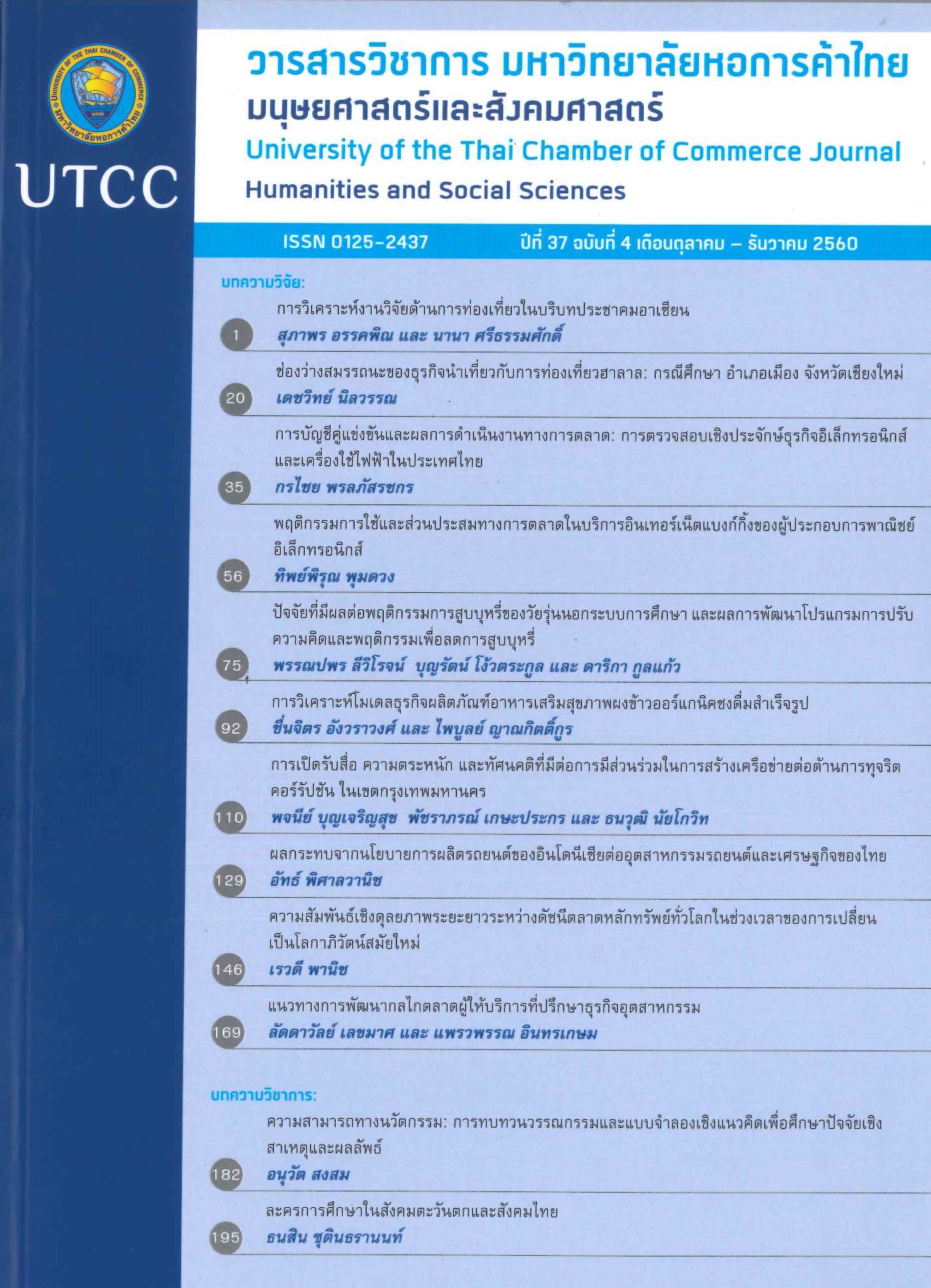The Competency Gap of Travel Agents for Halal Tourism: A Case Study of Muang Chiang Mai District, Chiang Mai Province
Main Article Content
Abstract
The objective of this research is to monitor the skill level of the travel agents in Chiang Mai and the expected competency in serving Muslim tourists. Twenty-four travel agencies in Chiang Mai participated in this study, using self-assessment on the expected competency levels and an assessment of competency, consisting of three categories: core competencies, generic competencies and specific functional competencies on Halal; altogether there were 23 sub-capacities out of four work positions – General Manager, Assistant General Manager, Senior Travel Consultant, and Travel Consultant. The assessment form is divided into two sections: the first is designed to assess the expectations of the competencies in each position, while the second to assess the competency level of each position by analyzing the data and comparing the gap in competencies identified in the four positions. It was found that there is a statistically significant difference at the 95% confidence level between the expected competencies and the current level of competency on three aspects and in three of the positions: General Manager, Assistant General Manager, and Travel Consultant.
Article Details
ลิขสิทธิ์ของบทความ
ผลงานที่ได้รับการตีพิมพ์ถือเป็นลิขสิทธิ์ของมหาวิทยาลัยหอการค้าไทย ห้ามมิให้นำเนื้อหา ทัศนะ หรือข้อคิดเห็นใด ๆ ของผลงานไปทำซ้ำ ดัดแปลง หรือเผยแพร่ ไม่ว่าทั้งหมดหรือบางส่วนโดยไม่ได้รับอนุญาตเป็นลายลักษณ์อักษรจากมหาวิทยาลัยหอการค้าไทยก่อน
References
Association of Southeast Asian Nations. (2013). Association of Southeast Asian Nations. (2013). ASEAN mutual recognition arrangement on tourism professionals: Handbook.
Retrieved January 15, 2016, from https://www.asean.org/storage/images/2013/ economic/handbook MRA tourism_opt.pdf
Battour, M., & Ismail, M. N. (2015). Halal tourism:Concepts, practices, challenges and future. Tourism Management Perspectives, 19(B), 150-154. dx.doi.org/10.1016/j.tmp.2015.12.008
Boyatzis, R. (2008). Competencies in the 21st century. Journal of Management Development, 27(1), 5-12. dx.doi.org/10.1108/02621710810840730
Chookaew, S., Chanin, O., Charatarawat, J.,Sriprasert, P., & Nimpaya, P. (2015).Increasing halal tourism potential at Andaman Gulf in Thailand for Muslim country. Journal of Economics, Business and Management, 3(7), 739-741.
Hafeez, K., & Essmail, E. A. (2007). Evaluating organization core competences and associated personal competencies using analytical hierarchy process. Management Research News, 30(8), 530-547. dx.doi.org/10.110 boyatzis 8/01409170710773689
Henderson, J. C. (2009). Islam tourism reviewed. Tourism Recreation Research, 34(2), 207-211.
Jackson, S. E., & Schuler, R. S. (2014). Human resource management and organizational effectiveness: Yesterday and today. Journal of Organization Effectiveness People and Performance, 1(1), 35-55.
Janchai, N. (2011). Travel agency management. Bangkok, Thailand: Suan Dusit Rajabhat University
MasterCard, & CrescentRating. (2016). Global Muslim travel index 2016. Retrieved April 15, 2016, from https://newsroom.mastercard.com/asia-pacific/files/2016/03/Report-MasterCard-CrescentRatingGlobal-Muslim-Travel-Index-2016.pdf
Muqbil, I. (2015). Thailand’s Muslim-friendly destination strategy goes well beyond just tourism. Travel Impact Newswire. Retrieved from https://www.tatnews.org/ pdf/Recommendedblog/Muslim-FriendlyApplicaton.pdf
Pew Research Center. (2015). The future of world religions: Population growth projections, 2010-2050. Retrieved January 15, 2016, from https://www.pewforum.org/2015/04/02/religious-projections2010-2050/
Visit Thailand again. (2013, June 14). Dailynews.Retrieved from https://m.dailynews.co.th/News.do?contentId=82960 (in Thai).
Wadongo, B., Kambona, O., & Odhuna, E.(2011). Emerging critical generic managerial competencies: A challenge to hospitality educators in Kenya. African Journal of
Economic and Management Studies, 2(1), 56-71. dx.doi.org/10.1108/ 20400701111110777

